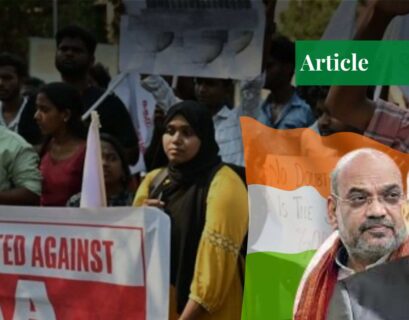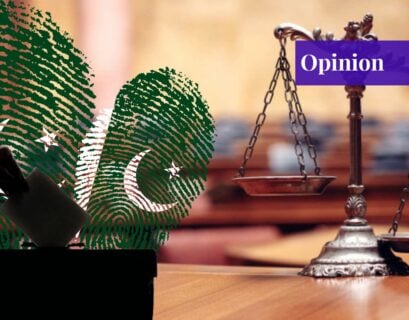The chimera of justice often wavers. In this realm, the judiciary, the guardians of the rule of law, hold individuals to account; yet, the executive, often shrouded in impunity, elude the sword of accountability. Countless are the instances when the law enforcement agencies in Pakistan have conducted raids without warrant, arrests without cause, torture without conscience – all with the resounding hush within the courtrooms, hinting at an executive immunity that not only condones, but fosters such infamies.
The judiciary is one of the three organs of a state, and serves as an indispensable facet in a democratic society. Under the doctrine of separation of powers, it bears the sole responsibility of interpreting the law. However, there are moments when its calling transforms from an interpreter to that of an enforcer – when other branches of the state transcend their constitutional limitations.
Over the years, there have been numerous occurrences of the executive overstepping its constitutional parameters, even ethical as some would say, and the judiciary had to intervene to keep them in check.
Among such instances are the recent conviction of Imran Khan, disqualification of then-Prime Minister, Nawaz Sharif, and judiciary’s pivotal role in challenging the executive’s attempt of imposing a state of emergency in 2007. Each time the executive transgressed its constitutional bounds, prompting the judiciary to don its armor and wield its sword on behalf of the people. However, certain executive transgressions remain unscathed: arbitrary violations of the fundamental rights of individuals.
While the colonizers have long departed, their draconian methods of policing continue to cast a dark shadow over the post-subcontinent. The Pakistani police persist in conducting unwarranted raids, making unlawful arrests, employing torture to coerce confessions, and in certain cases, resorting to extrajudicial killings.
Such arbitrary actions not only violate the constitution of the country but also elicit doubt on Pakistan’s adherence to its international legal obligations stemming from the United Nations Convention Against Torture (UNCAT), and the International Covenant on Civil and Political Rights (ICCPR).
Nonetheless, these constitutional breaches often slip through the clutches of law, shielded by the official authority of the perpetrator. A compelling instance to consider is the case of Abid Boxer, a former (dismissed) police inspector accused of land grabbing, extortion, kidnapping, torture, and orchestration of several extrajudicial killings, often referred to euphemistically as ‘encounters’. He has been recently booked by the Organized Crime Unit (OCU) for many other charges including terrorism. Majority of the atrocities associated with this man predate the inception of my conscious self-awareness; yet, the law is still trying to navigate through his infamies.
The issue of executive unaccountability for actions that infringe the fundamental rights of individuals at large came to the forefront on 23rd October 2023, when the Hon’ble Supreme Court of Pakistan issued a verdict, declaring military trials of civilians illegal and unconstitutional. While this much-awaited ruling is a win for democracy and the Constitution of the country, it did not attribute any responsibility for the purposes of retribution to the federal government of time, which had made the decision to subject civilians to military trials.
Illegal actions don’t emerge in a vacuum; they thrive in the corridors of power, and power all too often slips through the cracks of accountability. We should listen to Asad Rahim Khan: ‘we could try and pick up the little green book for a change’.
The fundamental rights in the Constitution are inviolable save in accordance with the law. Right to life and liberty, safeguards against unlawful arrests, right to fair-trial, and protection from torturous acts, all are recognized by the constitution as fundamental rights that shall prevail over all other laws, customs, or ‘usage(s) having the force of law’.
But then, how could the government at that time choose to disregard the Constitution’s protection of fundamental rights and proceed with, or even argue for, trials of civilians by martial courts? Was it born out of a profound ignorance of the Constitution’s sacred principles, or was it a deliberate defiance of its hallowed provisions? Either way, does this not amount to an attempt to subvert or undermine the Constitution?
All individuals, regardless of their cloak of executive protection, must be held accountable under the law. Accountability of all is what shall help this country rise from the ashes – and the judiciary has a determinative role in this ascent: wielding the sword of the constitution. Per Roosevelt’s expression: ‘No man is above the law and no man is below it.’
If you want to submit your articles, research papers, and book reviews, please check the Submissions page.
The views and opinions expressed in this article/paper are the author’s own and do not necessarily reflect the editorial position of Paradigm Shift.



















